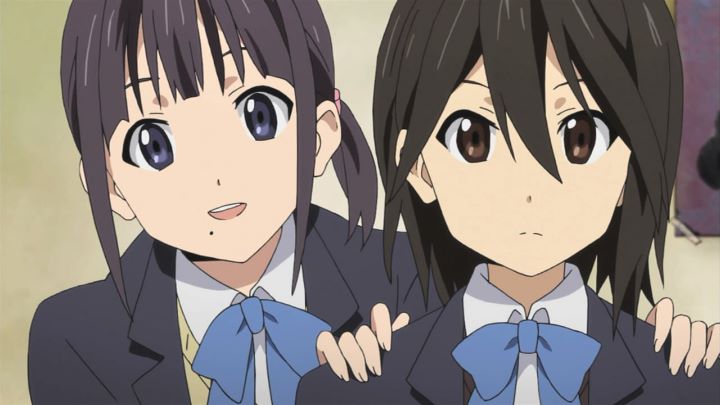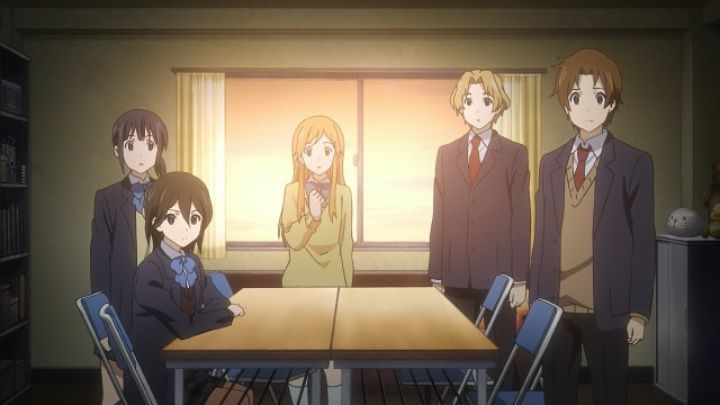








The 2012 anime "Kokoro Connect" is summarized by most viewers and its overseas' licensors as a high-school comedy-drama-romance, where a group of five friends find themselves in a situation where they randomly switch bodies with each other. Naturally, this forces each character to understand each other a little better against their will. This isn't the first time this type of conceit was used (the most well known in North America being Disney's multiple live-action films "Freaky Friday," based on a popular book, the most recent film being released in 2003), but the show's broadcast probably had a small part in making the idea popular in anime years later (see 2016's "Kiznaiver" and 2016's "Your Name." for similar themes, conveniently timed such that their stories probably formed after having watched "Kokoro Connect"). Indeed, the story has this strange phenomenon happen to five high-school friends, thanks to a mysterious entity who calls himself "Heartseed," occasionally speaking to the characters by taking over a teacher's body for a few moments to explain the situation to them. At first, the occurance comes across as an opportunity for humor: only lasting for a few minutes at a time, the first episode has fun with the boys and girls getting swapped wtih each other and embaressed with their unfamiliar gender. But naturally, this causes the five friends to reveal more about themselves to each other than they had wanted to, and we learn more about their individual backstories: one was (almost) raped as a young girl, one has a mother that dates a string of abusive men, one had a past romance that they had forgotten about, etc. To throw in more confusion, multiple potential love triangles ensue. The "body-swapping" storyline is a bit misleading in the show's description, as it is only one arc out of three in the show (or out of four, if you include the four-episode OVA). Each arc has an entirely new supernatural concept to make these teenagers reveal more about each other and about themselves: in total, they cover body-swapping, impulsively acting on their subsconcious desires without control, turning into children and recalling past memories, and spontaneous mind-reading. Each arc is approximately long enough to act as their own feature film. I hesitate to describe this show as one in the fantasy or science-fiction genre, as the mechanics or reasons behind these phenomenon never really get a clear explaination. It feels more accurate to describe these occurances as "horror" based on the tone. Heartseed himself is simply an excuse to make these situations trigger, and his existance is as mysterious in the first episode as it is in the last. He says he does this because "it makes things interesting..." but is he an alien trying to understand human emotions? A scientist testing out his new abilities? A God who is genuinely bored? I like to think he is a story-writer for an anime production, putting these characters into emotional breakdowns for the sake of a best-selling hit. That's a pretty "meta" theory for you. Despite the lack of delivery on "why" the show's events occur, the story is surprisingly riveting through the character development, which single-handedly drives the show. While initially one-dimensional, all the main characters gain at least two or three dimensions to them pretty quickly. Essentially acting as a metaphor for puberty and high-school life, the reveals and conversations they have are brutally honest, covering emotional anxieties, masturbation, bullying, depression, and more. "Kokoro Connect" never really tries to alienate the audience by being too graphic: one of its characters was "almost" raped, and any honest descriptions of sexual desires are stopped before they go to far. Given the intended audience, I think this was the best choice to make the show accessible, while still covering topics that isn't often covered. In this way, it's a fantastic story for young teenagers. And I should briefly talk about the romance aspects, which are integral to the story. Generally, they are portrayed with subtlety and honesty, making it a satisfying romantic drama. It is a little annoying that all three of the female main characters end up at least hinting at a romantic interest in the nice-guy lead, a boring character copied from countless other anime. And also, the different arcs do make the show outstay its welcome a bit. The first five-episode arc is executed really well, but the following arcs feel like it repeats the same beats from different angles. And they could have continued the pattern even further for much longer, but with where the show ends, it doesn't necessarily give a conclusive ending any more than the end of the first arc. With this opinion, the four-episode OVA (originally released separately by Sentai Filmworks in North America, and later included in a new set) is nice but unnecessary, even though episode 13 ends with a cliffhanger that leads into the OVA (labelled epidoes 14 through 17, as if it was a clear continuation meant to be part of the original broadcast). That last arc in particular is frustrating in how long it takes for the other characters to understand the trauma of the one in the worst state of mind, given that this was already hinted at in previous arcs pretty heavily, another reminder that a second or third season would be a bit too much to sit through.So yes, the story lacks some detail and goes on for a bit too long. But I found myself heavily invested in the characters, and watching the following arcs felt like a treat to simply see them again and to see how their relationships change. The production values are passable, but didn't quite stick well against other shows from around this period. The early 2010's was where there was a noticable improvement in quality for some anime, forcing other productions to try harder for the rest of the decade. Some shows benefited from this, others got lost along the way as looking outdated upon broadcast. In "Kokoro Connect," the animation is fairly minimal and limited, only occasionally putting in extra effort in facial expressions during especially emotional scenes. The character designs look similar to the popular anime "K-ON," where the faces are a bit rounded and the noses and mouths are a bit small. Yes, its cute in the style of "moe," but it took a little getting used-to and wasn't necessarily the best fit for the story. The voice actors had to work hard, especially in the first arc where they had to effectively act out the personalities of multiple characters. But it doesn't always work, and the English dub is a bit of a hit or miss in its delivery, tone and lip-syncing. Unfortunately, some of the characters just don't sound quite right in English, and the original Japanese is only slightly better."Kokoro Connect" is a fascinating high-school character drama that hit the right notes in making me laugh and cry and smile. It does feel like the writing was a little manipulative, but its hook works thanks to its honesty with common troubles plaguing the average teenager. It's largely due to its average-level production values that I didn't think more highly of the show, but these things don't necessarily effect the story, and therefore is still a memorable entry in its genre.
And I should briefly talk about the romance aspects, which are integral to the story. Generally, they are portrayed with subtlety and honesty, making it a satisfying romantic drama. It is a little annoying that all three of the female main characters end up at least hinting at a romantic interest in the nice-guy lead, a boring character copied from countless other anime. And also, the different arcs do make the show outstay its welcome a bit. The first five-episode arc is executed really well, but the following arcs feel like it repeats the same beats from different angles. And they could have continued the pattern even further for much longer, but with where the show ends, it doesn't necessarily give a conclusive ending any more than the end of the first arc. With this opinion, the four-episode OVA (originally released separately by Sentai Filmworks in North America, and later included in a new set) is nice but unnecessary, even though episode 13 ends with a cliffhanger that leads into the OVA (labelled epidoes 14 through 17, as if it was a clear continuation meant to be part of the original broadcast). That last arc in particular is frustrating in how long it takes for the other characters to understand the trauma of the one in the worst state of mind, given that this was already hinted at in previous arcs pretty heavily, another reminder that a second or third season would be a bit too much to sit through.So yes, the story lacks some detail and goes on for a bit too long. But I found myself heavily invested in the characters, and watching the following arcs felt like a treat to simply see them again and to see how their relationships change. The production values are passable, but didn't quite stick well against other shows from around this period. The early 2010's was where there was a noticable improvement in quality for some anime, forcing other productions to try harder for the rest of the decade. Some shows benefited from this, others got lost along the way as looking outdated upon broadcast. In "Kokoro Connect," the animation is fairly minimal and limited, only occasionally putting in extra effort in facial expressions during especially emotional scenes. The character designs look similar to the popular anime "K-ON," where the faces are a bit rounded and the noses and mouths are a bit small. Yes, its cute in the style of "moe," but it took a little getting used-to and wasn't necessarily the best fit for the story. The voice actors had to work hard, especially in the first arc where they had to effectively act out the personalities of multiple characters. But it doesn't always work, and the English dub is a bit of a hit or miss in its delivery, tone and lip-syncing. Unfortunately, some of the characters just don't sound quite right in English, and the original Japanese is only slightly better."Kokoro Connect" is a fascinating high-school character drama that hit the right notes in making me laugh and cry and smile. It does feel like the writing was a little manipulative, but its hook works thanks to its honesty with common troubles plaguing the average teenager. It's largely due to its average-level production values that I didn't think more highly of the show, but these things don't necessarily effect the story, and therefore is still a memorable entry in its genre.